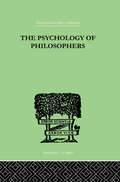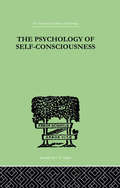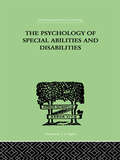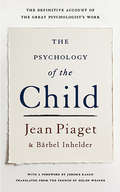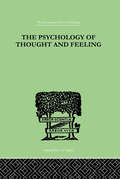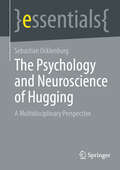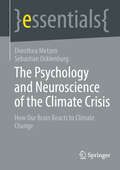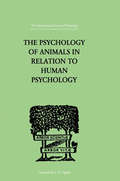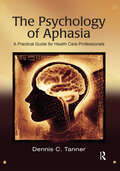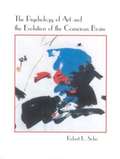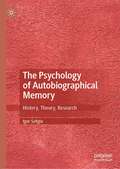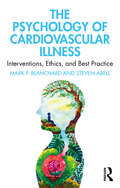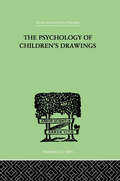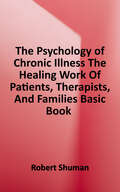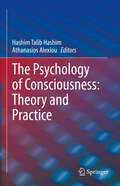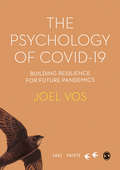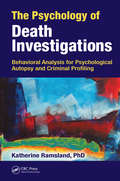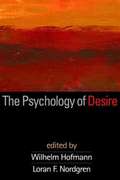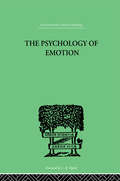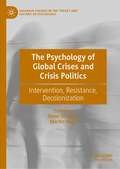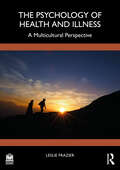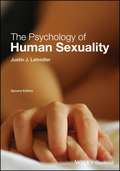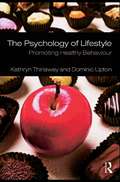- Table View
- List View
The Psychology Of Philosophers (International Library Of Psychology)
by Herzberg, AlexanderFirst Published in 1999. Routledge is an imprint of Taylor & Francis, an informa company.
The Psychology Of Self-Conciousness
by Turner, JuliaFirst Published in 1999. Routledge is an imprint of Taylor & Francis, an informa company.
The Psychology Of Special Abilities And Disabilities
by Bronner, Augusta FFirst Published in 1999. Routledge is an imprint of Taylor & Francis, an informa company.
The Psychology Of The Child: Classification And Seriation (International Library Of Psychology Ser.)
by Jean Piaget Barbel InhelderThe definite account of psychologist Jean Piaget's work Jean Piaget's influence on psychology has been profound. His pathbreaking investigations and theories of cognitive development have set child psychology moving in entirely new directions. His bold speculations have provided the inspiration for the work of others. His studies have been the subject of many books and countless articles. And, significantly, his influence has spread to other disciplines and is having an ever-growing impact on the general culture at large.Here Jean Piaget, with the assistance of his long-time collaborator Bärbel Inhelder, offers a definitive presentation of the developmental psychology he has elaborated over the last forty years. This comprehensive synthesis traces each stage of the child's cognitive development, over the entire period of childhood, from infancy to adolescence.
The Psychology Of Thought And Feeling: A Conservative Interpretation of Results in Modern Psychology (International Library Of Psychology Ser.)
by Platt, CharlesFirst Published in 1999. Routledge is an imprint of Taylor & Francis, an informa company.
The Psychology and Neuroscience of Hugging: A Multidisciplinary Perspective (essentials)
by Sebastian OcklenburgThis Springer essential aims to present the various research branches on the topic of hugging and to unite them in a multidisciplinary perspective. Hugs are an important part of close social relationships and, according to current research, can positively contribute to mental and physical health. The research interest in the scientific exploration of hugging has increased significantly in various disciplines in recent years.
The Psychology and Neuroscience of the Climate Crisis: How Our Brain Reacts to Climate Change (essentials)
by Sebastian Ocklenburg Dorothea MetzenThis Springer essential addresses the impacts of the climate crisis by integrating various branches of research from psychology and neuroscience. Climate change has massive effects on both the physical and mental health of individuals. The essential describes changes in brain function and structure due to environmental influences and explains the influence of ecological niches on brain evolution. The core part of the book focuses on the effects of the climate crisis on mental health, presents strategies for action in healthcare, and finally provides an outlook into the future of climate neuroscience.
The Psychology of Animals in Relation to Human Psychology
by F. AlverdesThis is Volume I of four in the Comparative Psychology series. First published in 1932, this study offers a short description of parts of animal psychology as are of interest to a wider public, at the same time exhibiting the many and various relations existing between human and animal psychology.
The Psychology of Aphasia: A Practical Guide for Health Care Professionals
by Dennis TannerBrain damage predisposes many persons with aphasia to a variety of psychological reactions, which are precipitated by stress and loss, and perpetuated by impaired verbal defense mechanisms and coping styles. Most of the literature on recovery from aphasia does not sufficiently address the overwhelming confusion and disorder that aphasia can cause in the patient, the communication partner, the communication between them, and their shared environment. The Psychology of Aphasia: A Practical Guide for Health Care Professionals fills this serious void.Dr. Dennis Tanner has studied the psychology of aphasia as a scientist and professor as well as evaluated and treated thousands of patients with neuropathologies of speech and language as a clinician over his 40-year career. This text represents the culmination of his efforts to understand the major psychological aspects of this complex communications disorder.The only text specifically addressing this topic, The Psychology of Aphasia is designed to provide the reader with a sound foundation of scientific information with current and historical scientific references spanning many decades. It delves into the certain psychological, emotional, and behavioral reactions that occur because of brain and nervous system damage, the psychological defenses and coping styles of patients and the verbal defense mechanisms they are deprived of due to their loss of language, as well as the grief response to the loss of physical abilities, valued objects, and the breakdown in communication.Each chapter is written in accessible language and provides practical case studies, illustrations, and examples of each major concept to reinforce learning.The whole aphasia rehabilitation team of speech-language pathologists, psychologists, physical and occupational therapists, social workers, physicians, nurses, home health aides, and family members will find The Psychology of Aphasia: A Practical Guide for Health Care Professionals an enlightening tool to bridge the gap between theoretical and practical issues in treating actual patients.
The Psychology of Art and the Evolution of the Conscious Brain
by Robert L. SolsoHow did the human brain evolve so that consciousness of art could develop? In The Psychology of Art and the Evolution of the Conscious Brain, Robert Solso describes how a consciousness that evolved for other purposes perceives and creates art.
The Psychology of Autobiographical Memory: History, Theory, Research
by Igor SotgiuThis book provides an overview of the key theoretical and empirical issues relating to autobiographical memory: the extraordinarily complex psychological activity that enables us to retrieve, relive and reappraise our pasts. The first part of the book retraces the genesis and historical development of the psychology of autobiographical memory, from the pioneering contributions of Francis Galton, Victor Henri and Sigmund Freud, to the most recent research in the fields of cognitivism, cognitive science and neuroscience. The author then moves on to two key topics in the contemporary panorama: the content and organisation of autobiographical memory (what we remember from our lives and how we link together specific segments of our personal pasts) and the functions of autobiographical memory (why we remember our pasts). This book will provide a valuable scholarly overview for cognitive psychologists and an authoritative critical introduction to the field for students and scholars from across psychology, philosophy, literary criticism, sociology and law.
The Psychology of Cardiovascular Illness: Interventions, Ethics, and Best Practice
by Mark P. Blanchard Steven AbellThis important book shows those working with clinical populations how to develop an understanding of the psychology of patients with cardiovascular problems to support appropriate medical care. An understanding of the psychological underpinnings of physical illness can alter the way clinicians conceptualize their patients and the communities they serve. Based on the latest research, this book offers suggestions about how to approach cardiovascular disease holistically in multidisciplinary medical settings with competence and professionalism in mind. With the escalating prevalence of cardiovascular diseases, this book flags the importance of understanding the psychological mechanisms at play in affected patients, highlighting the multifactorial pathways that lead to the development of physical health maladies and comorbid psychopathology. It describes the bidirectional relationship of cardiovascular disease with personality pathology and offers best practices in interacting between primary care, cardiology, psychologists, and other allied professionals. It also provides specific instruction about how to navigate the relationship with medical doctors while illustrating the unique ethical challenges or limitations of the health psychologist working with patients, their families, and providers in clinical practice. Moreover, it includes coverage of treatment plans taking into consideration individual differences in age, health status, and culture. This book will be of interest to anyone interested in furthering their knowledge about the complex interplay between cardiovascular problems and mental health conditions, especially clinical health psychologists who collaborate with social workers, primary care physicians, cardiologists, and surgeons alike.
The Psychology of Children's Drawings: From the First Stroke to the Coloured Drawing (International Library Of Psychology Ser.)
by Eng, HelgaFirst Published in 1999. Routledge is an imprint of Taylor & Francis, an informa company.
The Psychology of Chronic Illness: The Healing Work of Patients, Therapists, and Families
by Robert ShumanWith the onset of chronic illness, an individual and family’s world, previously taken for granted, is often undone. The actual and potential losses from illness impact family, friends, physicians, therapists, nurses, and others in profound and unexpected ways. Through his own honest, personal account and the testimony of others, Robert Shuman takes us inside the illness experience to help us better grasp the daily inner lives of the ailing person and his or her family. As our aging population lives longer, chronic illness touches more and more of us. Whether as patient or parent, nurse or spouse, colleague or therapist, we need to have greater knowledge and understanding of the intricacies of chronic illness. Robert Shuman maps out the many dimensions of illness and invites the reader to explore its challenging terrain in a way that provides opportunities for self-discovery and reflection. In lyrical prose, he opens up new ways of thinking about the psychology of illness and healing. He suggests, for example, that illness symptoms can have a generative effect on a person’s imaginative and creative possibilities, and that the socially despised events of illness and disability offer new ways of being once sought through the work of religion. Drawing on the fields of behavioral and family medicine, medical anthropology and sociology, moral and bioethical philosophies, and family, existential, cognitive, Jungian, and archetypal psychotherapies, among others, The Psychology of Chronic Illness raises provocative questions for the professional caregiver as well as for those living with illness and disability. This book will help anyone touched by illness, personally or professionally, to support those living with chronic illnesses and disabilities; to cope with multiple impacts on work, relationships, social roles, individual dreams, and disappointments; to listen to and voice suffering and fears, grief and anger, questions of values and moral doubts; and to acknowledge loss and mourning as a “common ground” that we all share. This book offers specific resources to the caregiver and aids the professional in his or her ethical obligation to give. Moreover, Shuman’s voice is one of compassion, reminding us how to hold on to or recover hope, meaning, and morale during times of affliction and distress.
The Psychology of Consciousness: Theory and Practice
by Athanasios Alexiou Hashim Talib HashimThis book talks about the levels of consciousness and their roles in controlling our life and behaviour. The consciousness has a main role in learning human to behave and to live in all life’s situation and ages. This book clarifies these situations in details and the laws that make this system work properly. It provides many solutions and suggestions to control ourselves and our minds and put them in the right way. This book explains many of our behaviours depending on the psychology and the role of the consciousness in the psychiatry, how to treat diseases and mental disorders and how to improve the mental health as well. This subject is not well discussed and detailed in literature so there is a need to give this topic its role in the psychology and in scientific literature too. This book is targeting the consciousness’ levels and the role of these levels in our life and behaviours, so it divides the roles among them as appropriate and in the right way and then the humans can recognize which part is more important than the other and on what they should focus.
The Psychology of Covid-19: Building Resilience for Future Pandemics (SAGE Swifts)
by Joel VosThe Psychology of Covid-19 explores how the coronavirus is giving rise to a new order in our personal lives, societies and politics. Rooted in systematic research on Covid-19 and previous pandemics, including SARS, Ebola, HIV and the Spanish Flu, this book describes how Covid-19 has impacted a broad range of domains, including self-perception, lifestyle, politics, mental health, media, and meaning in life. Building on this, the book then sets out how we can improve our psychological and social resilience, to safeguard ourselves against the psychological effects of future pandemics.
The Psychology of Covid-19: Building Resilience for Future Pandemics (SAGE Swifts)
by Joel VosThe Psychology of Covid-19 explores how the coronavirus is giving rise to a new order in our personal lives, societies and politics. Rooted in systematic research on Covid-19 and previous pandemics, including SARS, Ebola, HIV and the Spanish Flu, this book describes how Covid-19 has impacted a broad range of domains, including self-perception, lifestyle, politics, mental health, media, and meaning in life. Building on this, the book then sets out how we can improve our psychological and social resilience, to safeguard ourselves against the psychological effects of future pandemics.
The Psychology of Death Investigations: Behavioral Analysis for Psychological Autopsy and Criminal Profiling
by Katherine RamslandThe Psychology of Death Investigations outlines definitively how behavioral evidence can often provide the necessary components and "missing pieces" to complement physical evidence as an essential tool for incident reconstruction. In order to determine the direction of an investigation and to prioritize leads, if necessary, death investigators must establish the manner of a death: natural, accident, homicide or suicide. The most overlooked aspect of death investigation is the psychological dimension, which can provide unique leads, correct false assumptions, enhance investigative awareness, and solve cases in surprising ways. In an estimated 10–20% of cases, the manner of death cannot be determined, or worse, has been erroneously categorized. Since many jurisdictions can’t afford behavioral consultants, this book has been written to provide practical information for a basic psychological analysis. If the circumstances surrounding a death are equivocal, psychological consultants can compile information retrospectively about a deceased person’s mental state and possible motive to assist with unravelling ambiguity about the manner of death. This is the primary function of a psychological autopsy, and, as such, this is the first book of its kind dedicated solely to the topic. In the event that the manner of death is determined to be a homicide, behavioral profiling can help to focus the potential pool of suspects. Professionals and students alike will benefit from the exercise of cognitive awareness and the application of psychological logic presented. Psychologists, medical examiners, coroners, attorneys, fraud examiners, law enforcement personnel, death and homicide investigators, and students enrolled in criminal profiling, forensic psychology, and criminal justice programs will find this text to be a compelling and insightful reference to add to their professional toolkit.
The Psychology of Desire
by Loran F. Nordgren Wilhelm HofmannProviding a comprehensive perspective on human desire, this volume brings together leading experts from multiple psychological subdisciplines. It addresses such key questions as how desires of different kinds emerge, how they influence judgment and decision making, and how problematic desires can be effectively controlled. Current research is reviewed on underlying brain mechanisms and regulatory processes. Cutting-edge measurement tools are described, including practical recommendations for their use. The book also examines pathological forms of desire and the complex relationship between desire and happiness. The concluding section analyzes specific applied domains--eating, sex, aggression, substance use, shopping, and social media.
The Psychology of Emotion: Morbid and Normal (International Library Of Psychology)
by MacCurdy, John TThis is Volume XII of nineteen in a collection of Abnormal and Clinical Psychology. Originally published in 1925, this research stemmed from many discussions about the applicability of psychoanalytic principles to manic-depressive insanity, whether the symptoms could be traced to unconscious mental processes in the same way as Jung had demonstrated it to be possible in dementia praecox and ended up with the general objective moving from that of psychopathological to one of psychological conclusions .
The Psychology of Fatigue
by Robert HockeyFatigue can have a major impact on an individual's performance and wellbeing, yet is poorly understood, even within the scientific community. There is no developed theory of its origins or functions, and different types of fatigue (mental, physical, sleepiness) are routinely confused. The widespread interpretation of fatigue as a negative consequence of work may be true only for externally imposed goals; meaningful or self-initiated work is rarely tiring and often invigorating. In the first book dedicated to the systematic treatment of fatigue for over sixty years, Robert Hockey examines its many aspects - social history, neuroscience, energetics, exercise physiology, sleep and clinical implications - and develops a new motivational control theory, in which fatigue is treated as an emotion having a fundamental adaptive role in the management of goals. He then uses this new perspective to explore the role of fatigue in relation to individual motivation, working life and wellbeing.
The Psychology of Global Crises and Crisis Politics: Intervention, Resistance, Decolonization (Palgrave Studies in the Theory and History of Psychology)
by Martin Dege Irene StrasserThis edited volume brings together some of the most prominent scholars in the fields of theoretical, critical, and political psychology to examine crisis phenomena. The book investigates the role of psychology as a science in times of crisis, discusses how socio-political change affects the discipline and profession, and renders psychological interventions as forms of political action.The authors examine how notions of crisis and the interpretation of crisis scenarios are heavily intertwined with governmental and state interests. Seeking to disentangle individual subjectivity, subjectification, and science as forms of politics, the volume works toward an explicit goal to decolonize psychology. The chapters elaborate on the importance of the psychological sciences in times of crisis and the role of psychologists as practitioners. Ultimately, the diverse contributions underline the connection of scientific theory, practice, and politics.Interdisciplinary in scope and wide-ranging in its perspectives, this timely work will appeal to students and scholars of theoretical and political psychology, critical psychology, and cultural studies.
The Psychology of Health and Illness: A Multicultural Perspective
by Leslie D. FrazierThe Psychology of Health and Illness is a thoroughly updated version of Leslie Frazier’s previous textbook on health psychology, which provides an engaging and contemporary approach to understanding health psychology from a truly international perspective. Combining both biopsychosocial and lifespan developmental perspectives, the book integrates core theory, research, and practice on global and cross-cultural health issues. It includes thoughtful and deliberately inclusive coverage of marginalized groups, especially BIPOC, LGBTQ+, and other underrepresented groups, designed to raise diversity and racial consciousness in a globally integrative way.Alongside classic health psychology concepts, the author introduces students to cutting-edge scientific and medical topics such as epigenetics, the gut microbiome, and the nonmedical use of prescription drugs. The book also focuses on global public health and health disparities and promotes a strengths-based approach to health, rather than a deficits-based approach. It includes a wide range of pedagogical features including real-world applications, engaging anecdotes and case studies, opportunities for self-reflection, and numerous text boxes.This is essential reading for undergraduate students on Health Psychology courses as well as those in related fields such as nursing and the allied health professions.
The Psychology of Human Sexuality
by Justin J. Lehmiller<p>The thoroughly revised and updated second edition of The Psychology of Human Sexuality explores the roles that biology, psychology, and the social and cultural context play in shaping human sexual behavior. The author – a noted authority on the topic and an affiliate of the acclaimed Kinsey Institute - puts the spotlight on the most recent research and theory on human sexuality, with an emphasis on psychology. <p>The text presents the major theoretical perspectives on human sexuality, and details the vast diversity of sexual attitudes and behaviors that exist in the modern world. The author also reviews the history of sexology and explores its unique methods and ethical considerations. Overall, this important and comprehensive text provides readers with a better understanding of, and appreciation for, the science of sex and the amazing complexity of human sexuality.</p>
The Psychology of Lifestyle: Promoting Healthy Behaviour
by Dominic Upton Kathryn ThirlawayImproving lifestyles is thought to be one of the most effective means of reducing mortality and morbidity in the developed world. However, despite decades of health promotion, there has been no significant difference to lifestyles and instead there are rising levels of inactivity and obesity. The Psychology of Lifestyle addresses the role psychology can play in reversing the trend of deleterious lifestyle choices. It considers the common characteristics of lifestyle behaviours and reflects on how we can inform and improve interventions to promote healthy lifestyles. Health promotion has taught people what a healthy lifestyle is – now we need to enable people to live that life. The chapters cover key lifestyle behaviours that impact on health –smoking, eating, physical activity, drinking, sex and drug use – as well as combinations of behaviours. Each chapter contains interventions that have been developed to influence and promote lifestyle change among patients and clients. This unique book will enable readers to develop a clear theoretical and practical grasp of the psychological principles involved in all aspects of lifestyle change. It is an invaluable resource for students and professionals committed to health promotion within all health-related disciplines.
